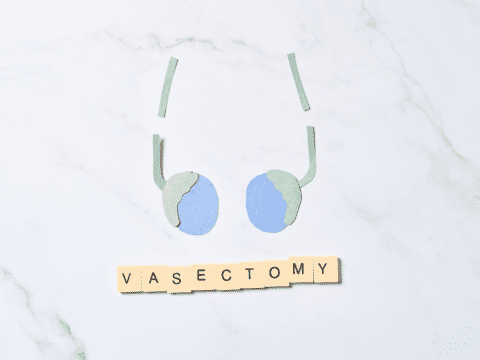Many men decide to have a vasectomy as a permanent form of contraception. However, studies indicate that 3-6% of men who undergo this procedure later decide to reverse it due to changing circumstances or desires. This decision often leads them to explore other options for starting a family. Fortunately, advancements in reproductive technology, such as IVF after vasectomy, offer promising solutions for such individuals. In such situations, seeking guidance from specialists is crucial.

At Nisha IVF, a well-recognized IVF Centre in Ahmedabad, Dr. Nisarg Patel offers personalized solutions for couples facing infertility challenges, including achieving pregnancy after vasectomy. Dr. Patel’s expertise in reproductive medicine ensures tailored solutions to achieve the cherished goal of becoming parents.
In this blog, we’ll discuss the intricacies of IVF after vasectomy, including its procedure, risks, and post-treatment care.
Understanding Vasectomy and Its Implications

Vasectomy is a popular form of male sterilization. This procedure involves cutting or blocking the tubes (vas deferens) that transport sperm from the testicles to the urethra. It prevents the sperm from reaching the semen. As a result, the ejaculation will no longer contain sperm, making it unlikely for you to father a child.
Vasectomy is a permanent and highly effective method of birth control. While it can be reversed through surgery, the success rate decreases over time. Within three years of the initial vasectomy, the success rate is around 90%. But after ten years, it may drop to 30-70%. Hence, it’s crucial to understand these implications before considering vasectomy.
Now, let’s discover how IVF can open new doors to parenthood post-vasectomy.
Exploring IVF as an Option After Vasectomy

IVF is a viable option for couples who want to conceive after a vasectomy. A vasectomy blocks sperm from reaching semen. This makes natural conception impossible. However, IVF can help overcome this obstacle.
IVF involves retrieving eggs and fertilizing them with sperm in a lab. The resulting embryos are transferred to the uterus for implantation. Thus, IVF provides a solution for couples facing difficulty conceiving due to a vasectomy.
“Consult a fertility specialist to determine whether IVF is the right option for you,” advises Dr. Nisarg Patel, a seasoned IVF doctor in Ahmedabad. “With the expertise and guidance of a qualified medical team, you can achieve pregnancy after vasectomy through IVF,” states Dr. Patel.
Are you seeking expert advice on vasectomy and IVF? Connect with prominent IVF specialists now.
Step-by-Step Process of IVF after Vasectomy

1. Consultation:
Meet a fertility specialist like Dr. Nisarg Patel to discuss your:
- medical history
- fertility goals
- options available post-vasectomy
2. Evaluation:
- Comprehensive fertility testing for both partners to assess reproductive health.
- Your fertility specialist may recommend additional tests to determine the best course of action.
- Women undergo hormonal therapy to stimulate the ovaries to produce multiple eggs.
- Monitoring through ultrasounds and blood tests ensures optimal egg development.
4. Egg Retrieval:
- When eggs are mature, a minor procedure retrieves them from the ovaries.
- It’s a quick and minimally invasive procedure performed under sedation.
5. Sperm Collection:
- If vasectomy prevents natural sperm release, sperm retrieval techniques like PESA or TESE are used.
- Embryologists ensure the collected sperm are viable and suitable for fertilization.
6. Fertilization:
- In the lab, eggs and sperm are combined to facilitate fertilization.
- Fertilized eggs develop into embryos over a few days under careful observation.
7. Embryo Transfer:
- High-quality embryos are selected for transfer into the uterus.
- The transfer is a simple procedure resembling a pap smear, typically painless.
8. Support and Monitoring:
- After the transfer, you’ll receive guidance on post-transfer care and medications.
- Your fertility doctor will monitor your progress closely through blood tests and ultrasounds.
9. Pregnancy Test:
- Approximately two weeks after the transfer, a pregnancy test determines if implantation has occurred.
- A positive result brings the joyous news of a successful post vasectomy pregnancy.
Learn about the hurdles and risks involved in IVF post-vasectomy.
Potential Challenges and Risks

1. Sperm Retrieval Difficulty:
Retrieving viable sperm post-vasectomy reversal can be challenging due to scarring or blockages in the vas deferens.
2. Low Sperm Quality:
Sperm retrieved after vasectomy may have reduced motility or morphology. This can affect the success rates of fertilization.
3. Lower Success Rates:
IVF success rates may be lower after vasectomy compared to couples without prior male sterilization. This could be due to factors like reduced sperm quality or quantity.
4. Increased Cost:
IVF after vasectomy can be costlier than other fertility treatments. Multiple cycles may be required for success, adding financial strain to the process.
5. Potential Complications:
As with any medical procedure, there are risks of complications associated with IVF after vasectomy, including:
- Ovarian Hyperstimulation Syndrome (OHSS)
- Ectopic pregnancy
- Multiple births
“It is essential to consider these factors, weigh them against potential benefits, and discuss them thoroughly with your doctor to make informed decisions about your fertility journey,” says Dr. Nisarg Patel.
Need personalized guidance and support on overcoming IVF challenges? Talk with highly qualified IVF doctors now!
Learn about the essential post-treatment care for IVF after vasectomy.
Post-treatment Care
1. Medications:
You’ll likely be prescribed medications to support embryo implantation and prevent complications. Take them as directed by your doctor.
2. Rest and Relaxation:
After the procedure, prioritize rest and avoid strenuous activities for a few days. Give your body the time it needs to recover and heal.
3. Hydration:

Stay well-hydrated to support your body’s recovery and optimize your chances of success. Avoid excessive caffeine or alcohol consumption.
4. Healthy Diet:

For IVF success, eat a nutrient-rich, balanced diet. Focus on whole foods, lean proteins, fruits, and vegetables.
5. Avoid Stress:

Minimize stress as much as possible during this crucial time. Engage in relaxation techniques such as deep breathing, meditation, or Yoga to promote overall well-being.
6. Follow-up appointments:
Attend follow-ups with your fertility specialist. These visits are essential for monitoring your progress and addressing concerns or questions.
7. Stay Positive:
Stay optimistic throughout the post-treatment period. Positive thinking can significantly impact your emotional well-being and overall outcome.
Overcoming Emotional and Psychological Challenges

– Acknowledge your emotions and communicate openly with your partner, friends, or counsellor.
– Educate yourself about the IVF process and potential challenges.
– Seek support from your fertility clinic’s team, support groups, or online communities.
– Practice self-care by prioritizing relaxation and stress reduction.
– Set realistic expectations and stay optimistic throughout your journey towards parenthood.
Conclusion
IVF after vasectomy can be a challenging but exciting journey towards parenthood. With the right support and guidance, achieving pregnancy after vasectomy is possible. Skilled fertility specialists like Dr. Nisarg Patel at the Nisha IVF Centre in Ahmedabad and technological advancements can make your dream of having a child a reality. It’s crucial to stay optimistic, remain informed, and trust the process.
Want to learn more about post-vasectomy pregnancy? Get in touch with experienced fertility experts now.
Frequently Asked Questions:
1. How long does a vasectomy last?
A vasectomy is a permanent birth control method that can be reversed in some cases. However, it’s important to note that the success rate of reversal decreases over time.
2. How can I get pregnant if my husband has a vasectomy?
If your partner has undergone a vasectomy and you wish to conceive, options such as IVF or sperm retrieval combined with IVF can help achieve pregnancy.
3. How soon after a vasectomy reversal can you get pregnant?
After a vasectomy reversal, pregnancy can occur once sperm returns to the semen within a few months to a year.
4. What is the success rate of pregnancy after vasectomy reversal?
The success rate of post vasectomy pregnancy depends on factors like:
- the length of time since the vasectomy
- the age of the female partner
- the quality of sperm
- the quality of egg
5. Are there any age restrictions for IVF after vasectomy?
There are typically no strict age restrictions for IVF after vasectomy. However, advanced age may decrease IVF success rates.


